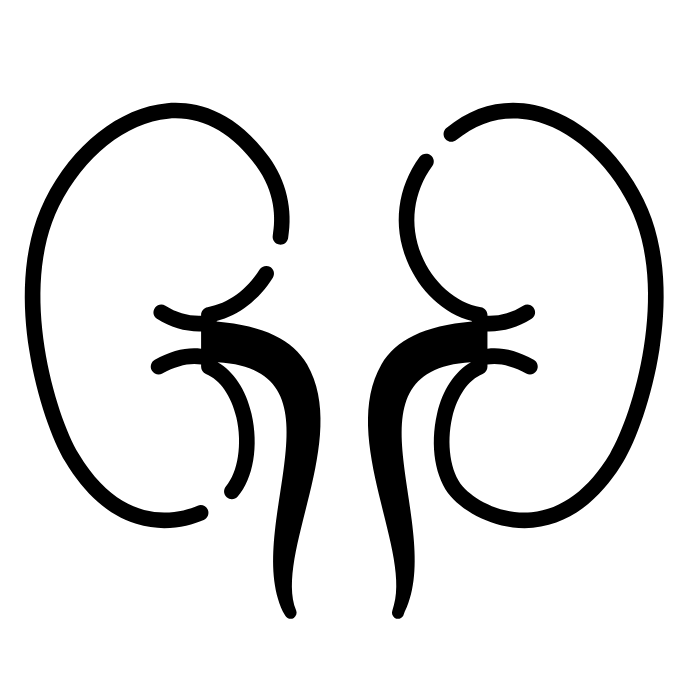Sarah's Herbal Garden
Kidney Detox Tincture
Kidney Detox Tincture
Couldn't load pickup availability
2 fl. oz. (56.7 g)
This product can be purchased singularly or as a part of our 3 month Full Detox Protocol! We recommend detoxing the urinary system once per year.
The urinary system is crucial for removing toxic waste from the body. Also known as the renal system, is responsible for removing waste products from the body and maintaining fluid and electrolyte balance. The kidneys filter blood to remove waste products and excess substances, producing urine. They filter out toxins, drugs, and their metabolites from the bloodstream. They excrete metabolic waste products such as urea, creatinine, and uric acid, which are byproducts of protein metabolism and muscle activity. The kidneys maintain the balance of fluids and electrolytes such as sodium, potassium, calcium, and phosphate. They help regulate the pH of the blood by excreting hydrogen ions and reabsorbing bicarbonate. They also regulate blood pressure through the renin-angiotensin-aldosterone system (RAAS).
When waste and toxins build up in the urinary system, it can cause a slew of problems. Keeping the renal system clean and toned can strengthen the immune system, increase energy, decrease aches and pains, reduce acne issues, restore mental clarity, reduce body odor, and the list goes on!
Here are some signs that you may need to clean and tone the renal system:
Fatigue and Low Energy:
Persistent tiredness and lack of energy can be a sign that your kidneys are not effectively filtering waste products from your blood.
Changes in Urination:
Increased or decreased frequency of urination, particularly at night (nocturia), urine that appears foamy or bubbly, blood in the urine (hematuria), pain or discomfort during urination.
Swelling and Edema:
Swelling in the legs, ankles, feet, face, and hands due to fluid retention.
Lower Back Pain:
Pain in the lower back, sides, or flanks where the kidneys are located, which could indicate a kidney infection or stones.
Skin Issues:
Persistent itching, dry skin, and rashes can be a sign of waste buildup in the bloodstream.
Digestive Problems:
Nausea, vomiting, and loss of appetite due to the accumulation of waste products in the body.
Bad Breath and Metallic Taste:
Breath that smells like ammonia or a metallic taste in the mouth.
High Blood Pressure:
Difficulty managing blood pressure, as the kidneys play a key role in regulating blood pressure.
Muscle Cramps and Pain:
Frequent muscle cramps, particularly in the legs, due to electrolyte imbalances.
Mental Fog and Concentration Issues:
Difficulty concentrating, memory issues, and general cognitive impairment.
Dark Circles and Puffiness Around Eyes:
Puffy eyes and dark circles can be an early sign of kidney dysfunction, often related to fluid retention.
The herbs for this tincture were each chosen for their unique properties to detox and tone the renal system!
These statements have not been evaluated by the Food and Drug Administration. This product is not intended to diagnose, treat, cure, or prevent any disease. Consult with healthcare provider if pregnant or breastfeeding, have an underlying health conditions, beginning an herbal supplement for the first time, or are taking other medications.
Share



Herbs used in this blend

Dandelion
Dandelion root (Taraxacum officinale) is a well-known herbal remedy that has been traditionally used to support kidney health and detoxification. Here's how dandelion root helps detox the kidneys:
1. Diuretic Properties
- Promotes Urine Production: Dandelion root is a natural diuretic, meaning it increases urine production. This helps the kidneys flush out toxins, waste products, and excess fluids more effectively, reducing the burden on the kidneys and supporting their natural detoxification processes. The increased urine flow helps to cleanse the kidneys and urinary tract by preventing the buildup of waste products and reducing the risk of kidney stones and infections.
2. Rich in Potassium
- Supports Electrolyte Balance: Dandelion root contains high levels of potassium, an essential mineral that helps balance electrolytes in the body. While dandelion root promotes the excretion of excess fluids, its potassium content helps replenish this vital mineral, ensuring that electrolyte levels remain balanced and supporting overall kidney function.
3. Anti-inflammatory Effects
- Reduces Inflammation in the Kidneys: Dandelion root has anti-inflammatory properties that can help reduce inflammation in the kidneys and urinary tract. Chronic inflammation can impair kidney function, so reducing it with dandelion root supports healthier kidneys and improves their ability to filter and eliminate toxins.
4. Antioxidant Properties
- Protects Kidney Cells from Damage: Dandelion root is rich in antioxidants, such as flavonoids, phenolic acids, and vitamin C, which help protect kidney cells from oxidative stress and damage caused by free radicals. By reducing oxidative stress, dandelion root supports the overall health and function of the kidneys, helping them to detoxify the body more effectively.
5. Detoxification Support
- Enhances Liver Function: The liver and kidneys work together to detoxify the body. Dandelion root is also known to support liver function, enhancing the liver’s ability to process and eliminate toxins from the blood. By improving liver function, dandelion root indirectly supports kidney detoxification, as the liver and kidneys share the workload of filtering and excreting waste.
6. Promotes Kidney Health
- Prevents Kidney Stones and Infections: By promoting increased urine flow and reducing inflammation, dandelion root can help prevent the formation of kidney stones and urinary tract infections, which can impair kidney function. Its diuretic effect helps to dilute urine and prevent the crystallization of minerals that can lead to stone formation.
7. Blood Pressure Regulation
- Supports Cardiovascular Health: The kidneys play a crucial role in regulating blood pressure by managing fluid balance and sodium levels in the body. By acting as a diuretic and supporting kidney function, dandelion root can help reduce fluid retention, lower blood pressure, and support cardiovascular health, which is closely linked to kidney health.
Nettle
Nettle (Urtica dioica), commonly known as stinging nettle, is a herb traditionally used for various health benefits, including supporting kidney function and detoxification. Here's how nettle helps detox the kidneys:
1. Diuretic Properties
- Promotes Urine Production: Nettle is a natural diuretic, meaning it increases urine production. By promoting urination, nettle helps the kidneys flush out toxins, waste products, and excess fluids more effectively. This process aids in cleansing the kidneys and the urinary tract, reducing the risk of kidney stones, urinary tract infections, and other kidney-related issues.
2. Anti-inflammatory Effects
- Reduces Inflammation in the Kidneys: Nettle has potent anti-inflammatory properties, which can help reduce inflammation in the kidneys and urinary tract. Chronic inflammation can impair kidney function and lead to conditions such as nephritis. By reducing inflammation, nettle supports the health and efficiency of the kidneys, allowing them to perform their detoxification role more effectively.
3. Rich in Nutrients
- Supports Kidney Health: Nettle is rich in vitamins (such as A, C, and K) and minerals (such as iron, calcium, magnesium, and potassium) that are essential for maintaining overall health, including kidney function. The potassium content in nettle helps balance electrolytes, which is crucial when using diuretics to ensure that the body maintains proper fluid and electrolyte balance.
4. Antioxidant Properties
- Protects Kidney Cells from Damage: Nettle contains various antioxidants, including flavonoids, carotenoids, and polyphenols, which help protect kidney cells from oxidative stress and damage caused by free radicals. By neutralizing free radicals, nettle reduces oxidative damage to the kidneys, supporting their long-term health and function.
5. Supports Circulatory Health
- Enhances Blood Flow to the Kidneys: Nettle is known to improve circulation, which can enhance blood flow to the kidneys. Better blood flow ensures that the kidneys receive the oxygen and nutrients they need to function properly and effectively filter and eliminate toxins from the body.
6. Prevents and Treats Kidney Stones
- Reduces the Risk of Stone Formation: The diuretic effect of nettle helps prevent the formation of kidney stones by diluting urine and preventing the crystallization of minerals, such as calcium oxalate, that can lead to stone formation. Additionally, nettle’s anti-inflammatory and antioxidant properties may help reduce the likelihood of kidney stone formation and alleviate symptoms if stones are present.
7. Detoxification Support
- Enhances Kidney Detoxification Processes: By supporting the kidneys' natural ability to filter and excrete waste, nettle helps detoxify the body. This includes assisting the kidneys in removing metabolic waste, environmental toxins, and excess substances such as urea and creatinine, which can build up in the blood if kidney function is impaired.
8. Alleviates Symptoms of Urinary Tract Infections
- Soothes and Cleanses the Urinary Tract: Nettle's diuretic and anti-inflammatory properties can help soothe and cleanse the urinary tract, reducing symptoms of urinary tract infections (UTIs). By promoting urine flow, nettle helps flush out bacteria and other pathogens that can cause infections, indirectly supporting kidney health.
Cleavers
Cleavers (Galium aparine), a herb traditionally used in herbal medicine, is known for its role in detoxifying the lymphatic system and supporting kidney health. Here's how cleavers help detox the kidneys:
1. Diuretic Properties
- Increases Urine Production: Cleavers are a natural diuretic, meaning they promote increased urine flow. This diuretic action helps the kidneys flush out toxins, waste products, and excess fluids more efficiently. By encouraging more frequent urination, cleavers help cleanse the kidneys and the urinary tract, reducing the risk of urinary tract infections and kidney stones.
2. Lymphatic System Support
- Aids in Waste Removal: Cleavers are known for their ability to stimulate the lymphatic system, which plays a key role in filtering and removing waste products from the body. By supporting the lymphatic system, cleavers help reduce the overall burden on the kidneys, as the lymphatic and urinary systems work together to eliminate toxins from the body.
3. Anti-inflammatory Effects
- Reduces Inflammation in the Kidneys: Cleavers possess anti-inflammatory properties that can help reduce inflammation in the kidneys and urinary tract. Inflammation can impair kidney function and lead to conditions such as nephritis. By reducing inflammation, cleavers support healthy kidney function and aid in the detoxification process.
4. Mild Diuretic without Depleting Electrolytes
- Maintains Electrolyte Balance: Unlike some stronger diuretics that can cause significant electrolyte imbalances, cleavers provide a gentler diuretic effect that helps maintain electrolyte balance while promoting kidney detoxification. This makes cleavers a safer option for supporting kidney health without causing dehydration or significant loss of essential minerals.
5. Soothing Effect on the Urinary Tract
- Helps Alleviate Irritation: Cleavers have a soothing effect on the urinary tract, which can help alleviate irritation and inflammation that might occur during the detoxification process. This soothing property is particularly beneficial for individuals experiencing symptoms of urinary tract infections or other urinary issues.
6. Blood Purification
- Supports Overall Detoxification: Cleavers are known as a blood purifier, helping to cleanse the blood of toxins and waste products. By improving blood quality, cleavers indirectly support kidney function, as cleaner blood reduces the workload on the kidneys and enhances their ability to filter and remove toxins.
7. Prevention of Kidney Stones
- Reduces the Risk of Stone Formation: The increased urine flow promoted by cleavers helps dilute the urine, reducing the concentration of minerals that can crystallize and form kidney stones. Regular use of cleavers may help prevent the formation of kidney stones by keeping the urinary tract flushed and free of stagnant fluids.
Saw Palmetto
Here's how saw palmetto might help support kidney health and detoxification:
1. Supports Prostate Health
- Reduces Urinary Tract Obstruction: Saw palmetto is well-known for its ability to reduce symptoms of benign prostatic hyperplasia (BPH), a condition where the prostate gland enlarges and presses against the urethra. This can lead to urinary retention and increased strain on the kidneys. By reducing prostate enlargement and improving urinary flow, saw palmetto helps alleviate pressure on the urinary tract, indirectly supporting kidney function and reducing the risk of complications like urinary tract infections or kidney stones.
2. Anti-inflammatory Properties
- Reduces Inflammation in the Urinary Tract: Saw palmetto has anti-inflammatory properties that can help reduce inflammation in the urinary tract, including the kidneys. Inflammation can impair kidney function and lead to various issues, so reducing it can help maintain healthy kidney function.
3. Diuretic Effects
- Promotes Urine Flow: Although saw palmetto is not a strong diuretic, it can have mild diuretic effects, which help promote urine flow. Improved urine flow can help the kidneys flush out toxins and waste products more effectively, supporting the body's natural detoxification processes.
4. Hormonal Balance
- Supports Hormonal Regulation: Saw palmetto is known for its ability to modulate hormonal balance, particularly testosterone and dihydrotestosterone (DHT). While this effect is more relevant to prostate health, maintaining hormonal balance can also indirectly support overall health, including kidney function, by reducing the risk of hormone-related issues that might affect the kidneys or urinary system.
5. Prevents Urinary Retention
- Reduces Strain on the Kidneys: By improving urinary flow and reducing urinary retention, saw palmetto helps prevent the buildup of urine in the bladder. This reduces the strain on the kidneys, as they do not have to work as hard to filter out waste products from the blood when the urinary tract is functioning optimally.
Parsley
Parsley root (Petroselinum crispum var. tuberosum) is a herb traditionally used for its medicinal properties, particularly in supporting kidney health and detoxification. Here's how parsley root helps detox the kidneys:
1. Diuretic Properties
- Promotes Urine Production: Parsley root is a natural diuretic, which means it increases urine production. This helps the kidneys flush out toxins, waste products, and excess fluids more effectively. By promoting frequent urination, parsley root helps cleanse the kidneys and urinary tract, reducing the risk of urinary tract infections (UTIs) and kidney stones.
2. Reduces Kidney Stone Formation
- Prevents Stone Formation: The diuretic effect of parsley root helps prevent the buildup of minerals and salts that can lead to the formation of kidney stones. By increasing urine output, parsley root reduces the concentration of these substances in the urine, thereby lowering the risk of kidney stone formation.
3. Anti-inflammatory Effects
- Reduces Inflammation in the Kidneys: Parsley root has anti-inflammatory properties that can help reduce inflammation in the kidneys and urinary tract. Inflammation can impair kidney function and contribute to conditions such as nephritis (inflammation of the kidneys). By reducing inflammation, parsley root supports healthy kidney function and enhances detoxification.
4. Antioxidant Properties
- Protects Kidney Cells from Damage: Parsley root is rich in antioxidants, such as flavonoids, vitamin C, and carotenoids, which help protect kidney cells from oxidative stress and damage caused by free radicals. By reducing oxidative stress, parsley root helps maintain healthy kidney function and supports the kidneys' role in detoxification.
5. Supports Electrolyte Balance
- Maintains Electrolyte Levels: As a diuretic, parsley root promotes the excretion of fluids, but it also helps maintain a balance of electrolytes, particularly potassium. This is important because excessive diuresis can lead to a loss of vital minerals, which could negatively impact kidney function. Parsley root’s potassium content helps offset this effect, ensuring that electrolyte levels remain balanced.
6. Cleanses the Urinary Tract
- Flushes Out Toxins: By increasing urine flow, parsley root helps flush out toxins, bacteria, and other waste products from the urinary tract. This cleansing action helps prevent infections and supports overall urinary tract health, indirectly benefiting the kidneys by reducing the risk of conditions that could strain kidney function.
7. Liver Support
- Enhances Overall Detoxification: The kidneys and liver work together to detoxify the body. Parsley root supports liver health by promoting detoxification processes, which can indirectly benefit kidney function. A healthy liver can better process toxins, reducing the burden on the kidneys.
8. Blood Pressure Regulation
- Supports Cardiovascular Health: The kidneys play a crucial role in regulating blood pressure by managing fluid balance and sodium levels. Parsley root's diuretic properties can help lower blood pressure by reducing fluid retention, which supports both kidney and cardiovascular health.
Check out our other detox products!
-
Colon, Lymph, Kidney, and Liver Detox
Regular price $90.00 USDRegular priceUnit price / per -
Clean Colon {Herbal Tea Blend for Occasional Constipation}
Regular price $12.00 USDRegular priceUnit price / per -
Lymph Detox Tincture
Regular price $29.00 USDRegular priceUnit price / per -
Kidney Detox Tincture
Regular price $29.00 USDRegular priceUnit price / per

Learn more about detoxing
From ditching toxic beauty and cleaning products, to eliminating processed food and embracing whole, organic food...fully detoxing is a lifestyle commitment!








